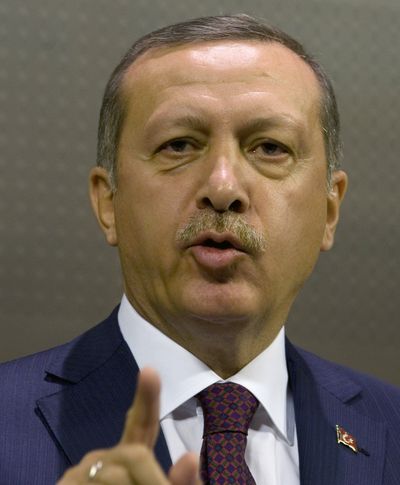Top Turkish military figures resign
Officers had been in conflict with civilian leaders

BEIRUT – The rift between Turkey’s once-dominant military old guard and its rising Islamist political elite took a dramatic turn when nearly all the country’s military leadership apparently resigned, escalating a power struggle in a nation that plays an increasingly vital role in the Middle East.
Turkish news reports said that the army chief of general staff, Gen. Isik Kosaner, and the officers heading the Turkish ground forces, navy and air force quit Friday.
The departures appear to have come in response to further attempts by charismatic Prime Minister Recep Tayyip Erdogan to bolster civilian control over the military after the landslide election victory in June of his Islamic-rooted Justice and Development Party.
Although details of what led to the resignations were initially unclear, the two sides have been locked in a standoff over the fate of dozens of military officers jailed and on trial for allegedly plotting to overthrow the government in 2003. The military contends that the incarcerations and charges are a politically motivated attempt to break the remaining power of the secular military establishment.
More officers were indicted this week in connection with coup attempts. Analysts say the military elite has been under pressure to fire those officers who remain in jail on conspiracy charges, even though they have yet to be convicted.
The extraordinary step of mass resignations at the military’s highest echelons followed a meeting by Kosaner with Erdogan and President Abdullah Gul. Turkey’s semiofficial Anatolia news agency quoted Kosaner as writing, “I resign my post as I deemed it necessary.”
It later rescinded the report and described the top general’s departure as a “retirement.”
Some saw the generals’ move as a sign that Erdogan has prevailed in a struggle that defined Turkish politics for a generation.
Others warned that the loss of the top brass had pushed Turkey into uncharted territory that could cause damage to Erdogan’s political position as well as the country’s reputation.
The departures clearly mark a significant moment in the trajectory of Turkey, a NATO member and onetime steadfast Western ally that, under Erdogan’s eight-year reign, has moved out from the shadow of nearly 80 years of domination by military figures, charting a new, more independent foreign policy.
The stability of Turkey is vital to American interests, because Washington looks to the nation as an ascendant Islamic power that could use its influence to dampen conflicts across the Middle East.
The Obama administration has recently turned to Turkey to pressure the Syrian government to ease its bloody crackdown on demonstrators. U.S. officials have sought Turkish help to stabilize post-invasion Iraq, and have tried – with less success – to foster better Turkish relations with Israel to ease Israeli-Arab frictions.
Greater strife between Turkey’s military and civilian leadership could complicate the administration’s Middle East diplomacy.